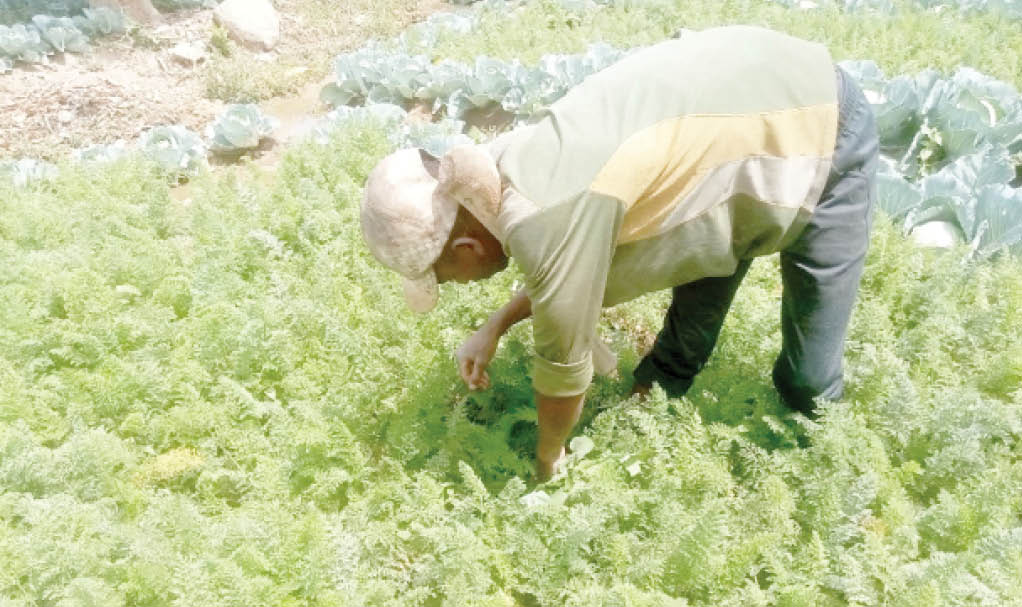Earnings from vegetables decline despite high cost of inputs – Farmers
The prevailing issue of skyrocketing prices of farm inputs has garnered widespread attention, with farmers across the country expressing their concerns about the situation. Farmers said the worst among the farming inputs, which prices have increased unabated in recent times, were fertiliser and insecticides. Their prices almost tripled, preventing many of them from going back […]

one of the vegetable farmers in jos
The prevailing issue of skyrocketing prices of farm inputs has garnered widespread attention, with farmers across the country expressing their concerns about the situation.
Farmers said the worst among the farming inputs, which prices have increased unabated in recent times, were fertiliser and insecticides. Their prices almost tripled, preventing many of them from going back to the farm or expanding cultivation, they said.
They said that on many occasions, the high cost of farming inputs negatively impacted their business because crop prices are often unstable in the market. This leads the farmers to lose their capital when prices crash in the market. This trend has become a common phenomenon in the farming business.
Although not all cash crops, such as cabbage, tomatoes and pepper experience simultaneous price crashes in the market, majority of them usually don’t witness ‘good market’ during harvest.
- Cocoa farmers affected by inferno seek improved seedlings, grant
- Plant early if you can, Emir of Muri tells farmers
With the unstable price of cash crops in the market, vis-a-vis the skyrocketing price of farming inputs, how are farmers able to manage to remain in the business?
Many farmers in Plateau who spoke to Daily Trust on Sunday said although it is possible to remain in the business, it is very difficult to succeed, adding that mixed cropping or inter cropping is the only saving grace when farmers find themselves in this kind of situation.
Samuel Azi, a cash crop farmer in Jos North Local Government Area of the state said, “Honestly, the prices of cash crops currently in the market are not encouraging. We bought farming inputs at very high prices. Also, the price of fuel, which we bought at a regular interval for our generators, has increased. The price of a basket of tomatoes is N5,000. It is not good at all.
“What we usually do is to engage in mixed cropping. We grow different crops like tomatoes, green beans, pepper, among others in the same field and with a single effort. In this situation, we catch two or three birds with one stone. If the price of tomatoes crashes, we are likely to gain from green beans or other crops in the farm.
“But looking at the situation of things in the market, coupled with the prices of farming inputs, if you depend on growing a single crop, you would not enjoy the business. So, this system helps us to recover from any likely loss in the day to day farming activities.”
Auwal Ibrahim, another farmer, said the prices of cash crops currently in the market were not good compared to what farmers spent to grow the crops. He said, “The current price of tomatoes, for example, is not favourable when you look at how much you spent on the farm. A basket is sold at N5,000 for example, so how would you make profit? Sometimes the farmers lose their money.
“In many instances you would have to harvest the tomatoes before they get rotten; and you must accept whatever price you get at the time of harvesting. People are just doing this business because it has become a part of their lives. But if one is wise enough and capable of growing more than one crop, they are likely to profit from either of the crops. This is one of the ways to succeed in the business.”
On how to save farmers from losing capital after commodity prices fall in the market, the farmers explained that if there is an alternative to the fall of the prices, farmers are not likely to record huge losses. A farmer said the intervention of government and other private individuals would go a long way in reducing losses in the farming business.
Umar Damisa, a farmer at Dorowa Babuje said, “If the government and other private companies were to buy the crops when the price falls in the market, it would lead to development because the farmers would not lose their capital. So, in this case, even if the price falls, we don’t have to fear anything. The government can buy them and store. This will go a long way in boosting the income of the farmers.”
